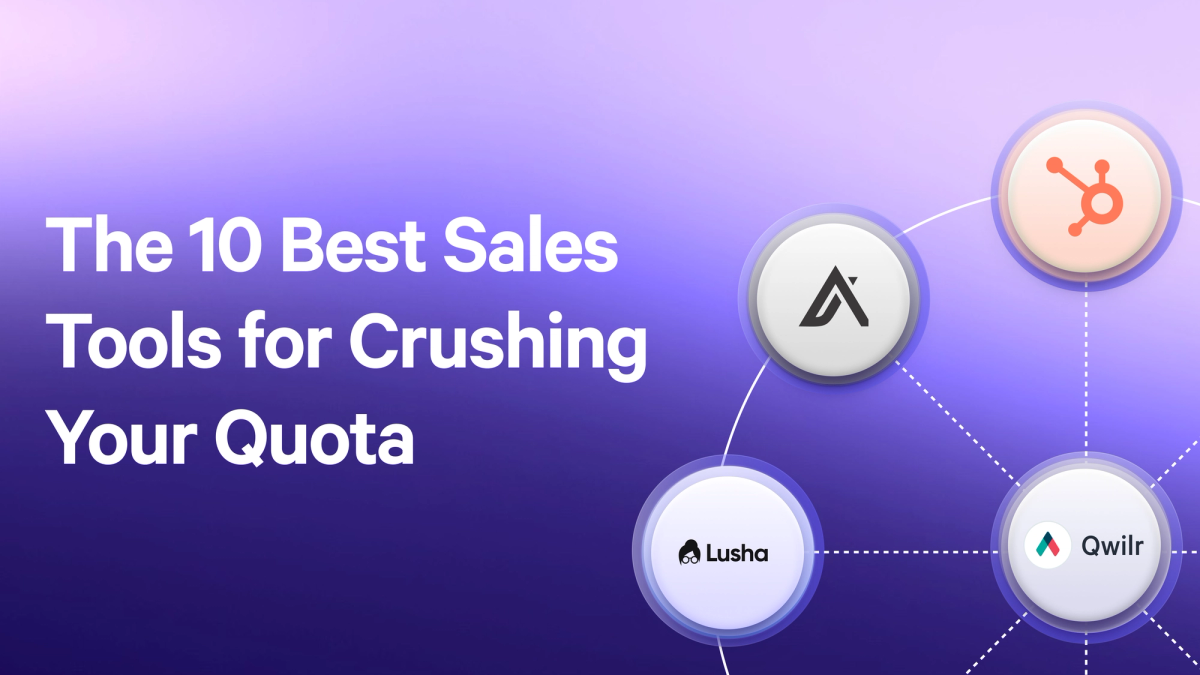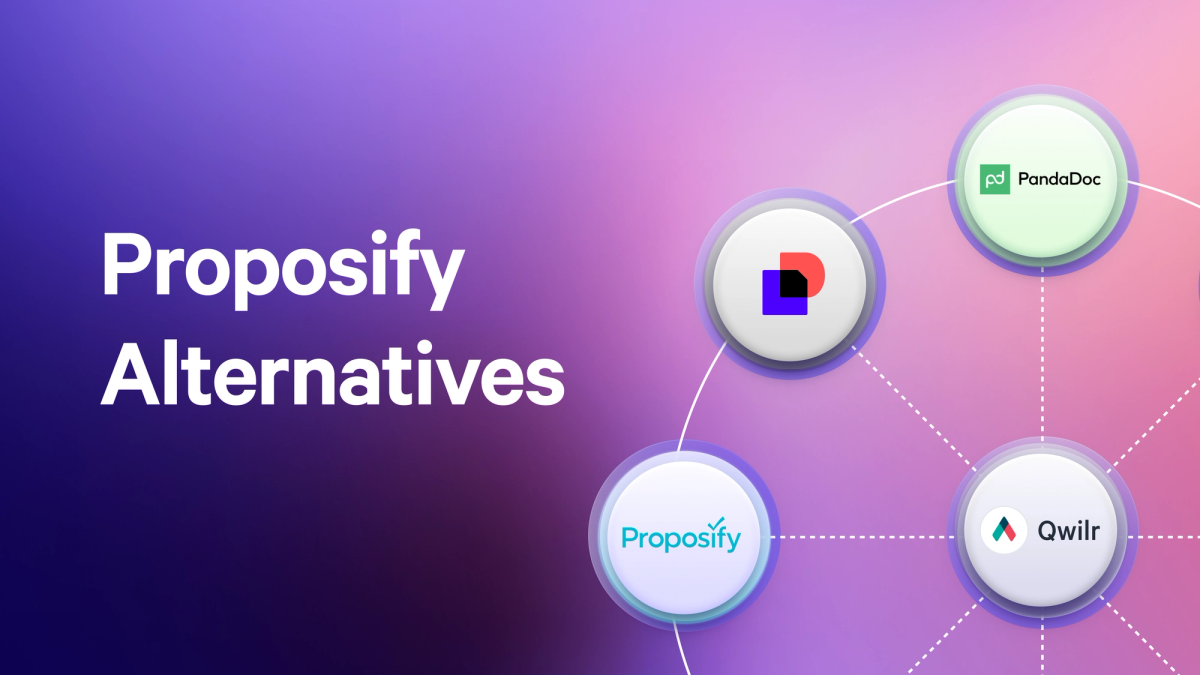Sales enablement software, sometimes called sales enablement tools, plays a major role in activating your strategy and is what your sales reps—the champions of the frontline— will depend on.
Given that 55% of C-suite leaders have identified sales enablement tools as their companies' most important technology investment, it's clear that these tools are now seen as essential for driving revenue and maintaining competitiveness in today's market.
We’ve done the heavy lifting—comparing the top solutions based on jobs to be done, feature stack, usability, and integrations—to bring you 8 top sales enablement software for your tech stack:
- Qwilr
- Hubspot
- Salesforce
- Lessonly
- Gong
- Outreach
- Showpad Coach
- Salesloft
Key takeaways:
- Sales enablement software is crucial for activating sales strategies and is a top technology investment for 55% of C-suite leaders.
- The best sales enablement tools provide resources, knowledge, and streamlined processes to supercharge sales success.
- A sales enablement stack should include sales content management tools, sales training and coaching, sales analytics and data insights, and sales automation features.
- Read on for specific tooling recommendations as you go about building your sales enablement stack.
Best sales enablement software breakdown
| Sales Enablement Tool | Category | Top Feature | Free Trial/Plan | Starting Price (USD)* | G2 Rating |
|---|---|---|---|---|---|
Qwilr | Proposal and document automation | Interactive, web-based pages | ✅ | $35/user/month | 4.5/5 |
Hubspot | CRM (SMBs) | Automated data capture | ✅ | $15/seat/month | 4.4/5 |
Salesforce | CRM (Enterprise) | Real-time sales insights | ✅ | $25/user/month | 4.4/5 |
Seismic Learning | LMS/learning reinforcement | Mobile Accessibility | ❌ | Contact sales | 4.7/5 |
Gong | Sales coaching | Call analytics | ❌ | Contact sales | 4.7/5 |
Outreach | Sales productivity and engagement | Sales engagement automation | ❌ | Contact sales | 4.3/5 |
Showpad Coach | Sales readiness | Video coaching | ❌ | Contact sales | 4.4/5 |
Salesloft | Conversation cloud | AI Chatbots | ❌ | Contact sales | 4.4/5 |
*Price as of October 2024
What are sales enablement tools?
Sales enablement software is the technology that enables organizations to deploy sales enablement resources to their sales teams. There are several types of software that serve different functions within the realm of sales enablement. All of these sales tools come with unique features, benefits, and associated costs for different teams such as B2B, startups and larger teams.
The primary purpose of sales enablement software is to streamline and enhance the sales process by providing sales reps with easy access to the right content, information, and resources at the right time.
Think of it as a one-stop shop for all things sales activities, ensuring that reps are well-prepared to engage prospects and close deals effectively. Sales enablement tools typically fall into several categories.
- Tools that centralize sales assets like case studies, product information, and competitive insights
- Software for training, including call recording, role-playing, best practices, and more
- Customer relationship management (CRM) integration
- Analytics and reporting
- Content and knowledge management
With all these categories combined, these tools can become the secret weapon for your sales organization, giving reps access to the right information at each step in the sales process and empowering them to conquer their sales pipelines with confidence and finesse.
What are the key components of a sales enablement stack?
There’s no one size fits all answer to what the key components of a sales enablement stack should be simply because it varies based on the goals and needs of the sales organizations themselves.
Ben Cotton—A global sales enablement leader who has worked with companies like Google, HubSpot, Indeed, and Edelman, talks about a few essential categories that sales teams should look at. In an in-depth post on the topic, he lists the following:
- Customer relationship management (CRM)
- Learning management systems (LMS)
- Learning reinforcement
- Sales coaching
- Sales readiness
- Sales productivity
- Sales engagement
- Sales asset management
- Other miscellaneous tools
“ There’s often huge overlap between the categories. Very few tools play in just one area, so you won’t need to go out and buy eight new tools.”
Ben Cotton, Global Sales Enablement Leader
He explains that when considering which tools are right for your team, think about the moments when the sales reps will use the tool, which will help you decide which tool will work best.
A sales enablement stack should have a mix of sales enablement content management tools, which helps organize and distribute relevant sales materials, like product brochures, case studies, and demo videos—followed by sales training and coaching, which offers continuous learning opportunities and supports sales reps' skill development.
Additionally, some tools provide sales analytics and data insights, enabling reps to track their progress and identify areas for improvement. Finally, sales enablement tools often offer sales automation features, such as email templates and prospecting tools, to streamline repetitive tasks and save valuable time.
It’s all about being strategic and aligning things to your overall sales enablement strategy!
Our 8 top sales enablement software recommendations
1. Qwilr: Proposal & document automation
G2 Rating: 4.5 / 5
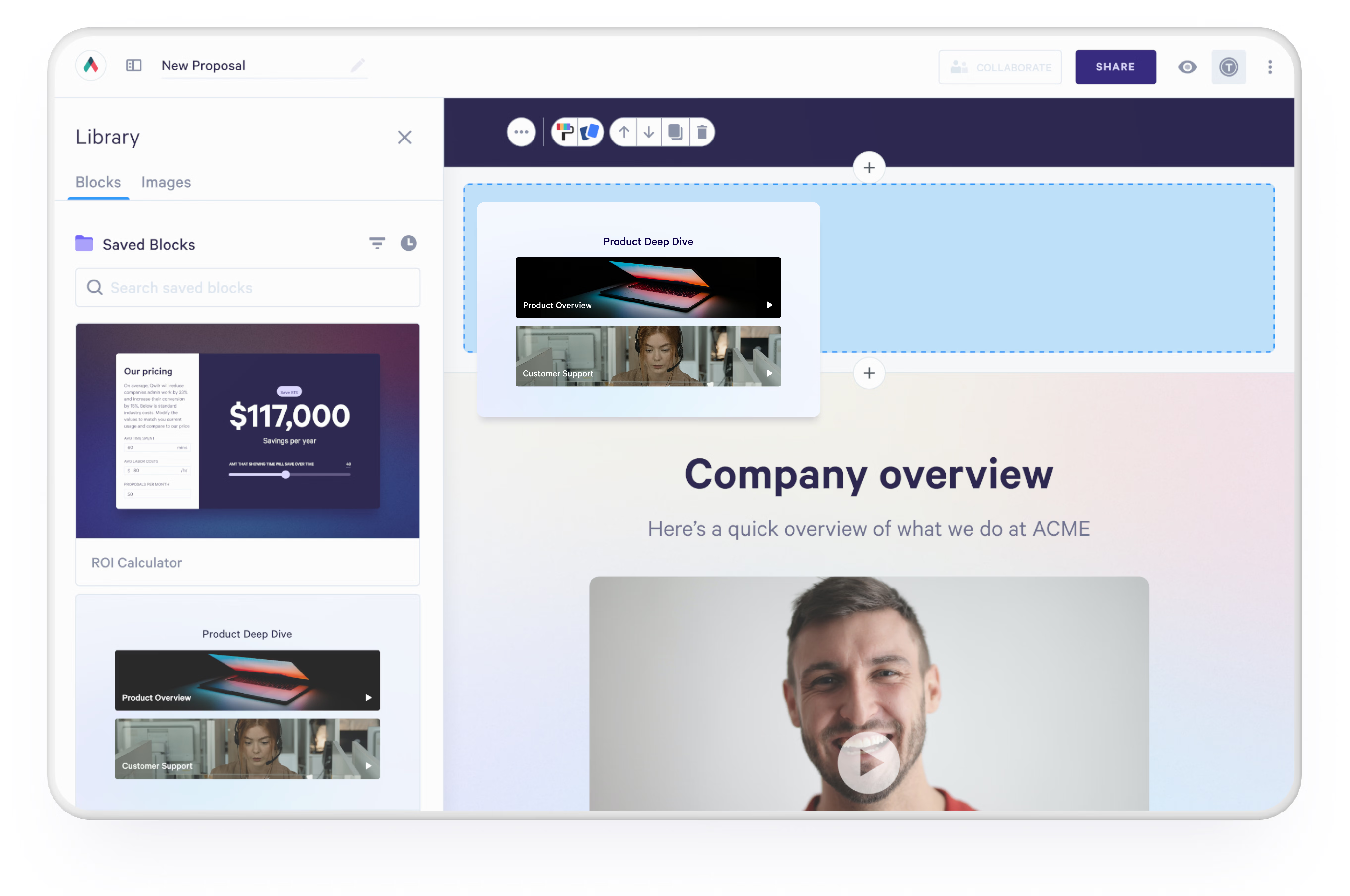
When it comes to effective sales, you want your sales reps to have access to up-to-date and relevant materials to present to potential clients. In addition, you want them to have access to sales proposals, quotes, and other documents without having to create them from scratch every time.
By automating these tasks, sales reps can save time, reduce errors, and maintain consistency in their messaging. Together, asset management and document automation software enhance the overall efficiency of the sales team, enabling them to focus on the more crucial bits— building relationships and closing deals.
This is the primary reason we built Qwilr. Our sales proposal management software allows sales reps to easily create visually stunning and interactive proposals. Users can choose from a range of proposal templates and customize them to showcase products, services, and proposals in a captivating and professional manner.
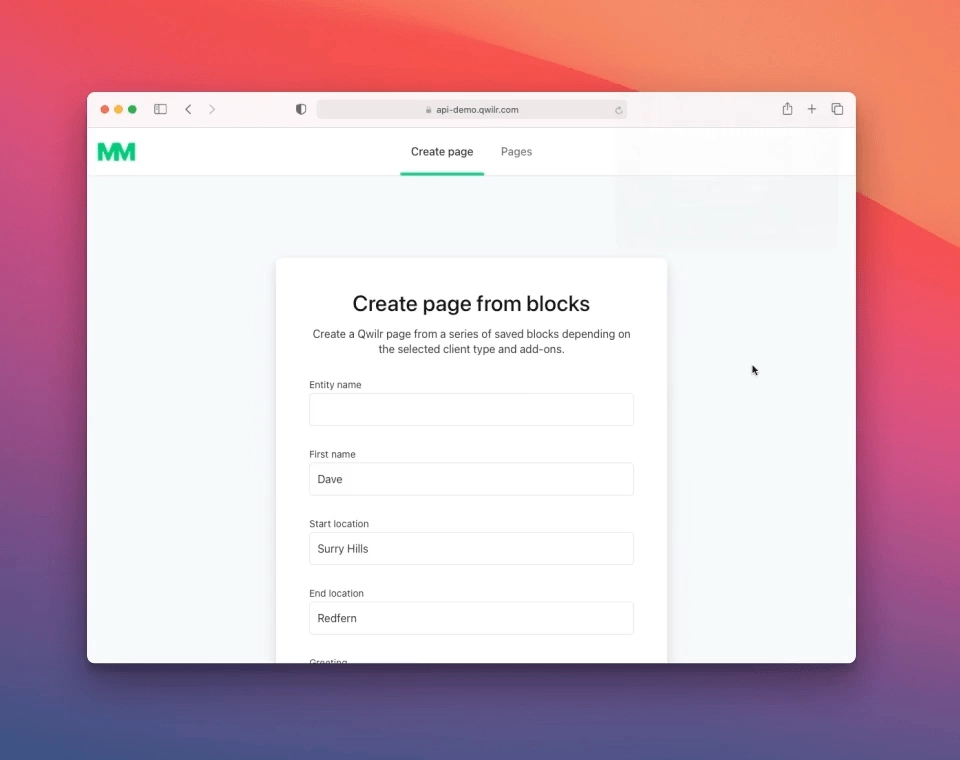
Top features
- Document automation capabilities: enable sales teams to quickly generate personalized proposals and quotes. With dynamic content and smart blocks, sales reps can tailor documents to individual clients, ensuring a personalized touch without the need for manual adjustments. Qwilr also has an AI proposal feature add-on.
- Asset management feature: lets users organize and store sales enablement collateral, ensuring easy access and consistent branding. Sales reps can easily embed videos, images, call recordings, and interactive elements into their documents, providing prospects with a more engaging and immersive experience.
- Real-time tracking and analytics: allowing sales teams to monitor prospect interactions with documents. This valuable insight helps identify interested prospects and understand what parts of the proposal or presentation resonate most with clients, enabling reps to tailor their follow-up strategies accordingly.
- eSignatures and payments: clients can sign contracts and make payments directly within the proposal, speeding up the sales cycle and reducing friction.
- Huge template library: Yes, Qwilr offers over 100+ professional proposal templates.
- Tracking and analytics: Users can see who engaged with their content and what they looked at when clicking.
- Integrations: Qwilr easily integrates with various sales software across the board, including many popular CRMs and communication tools, like Slack.
Want to see what it’s all about first? We offer a 14-day free trial.
- Business Plan: $35 USD per user/month
- Enterprise Plan: $59 USD per user/month
2. Hubspot: CRM
G2 Rating: 4.4 / 5
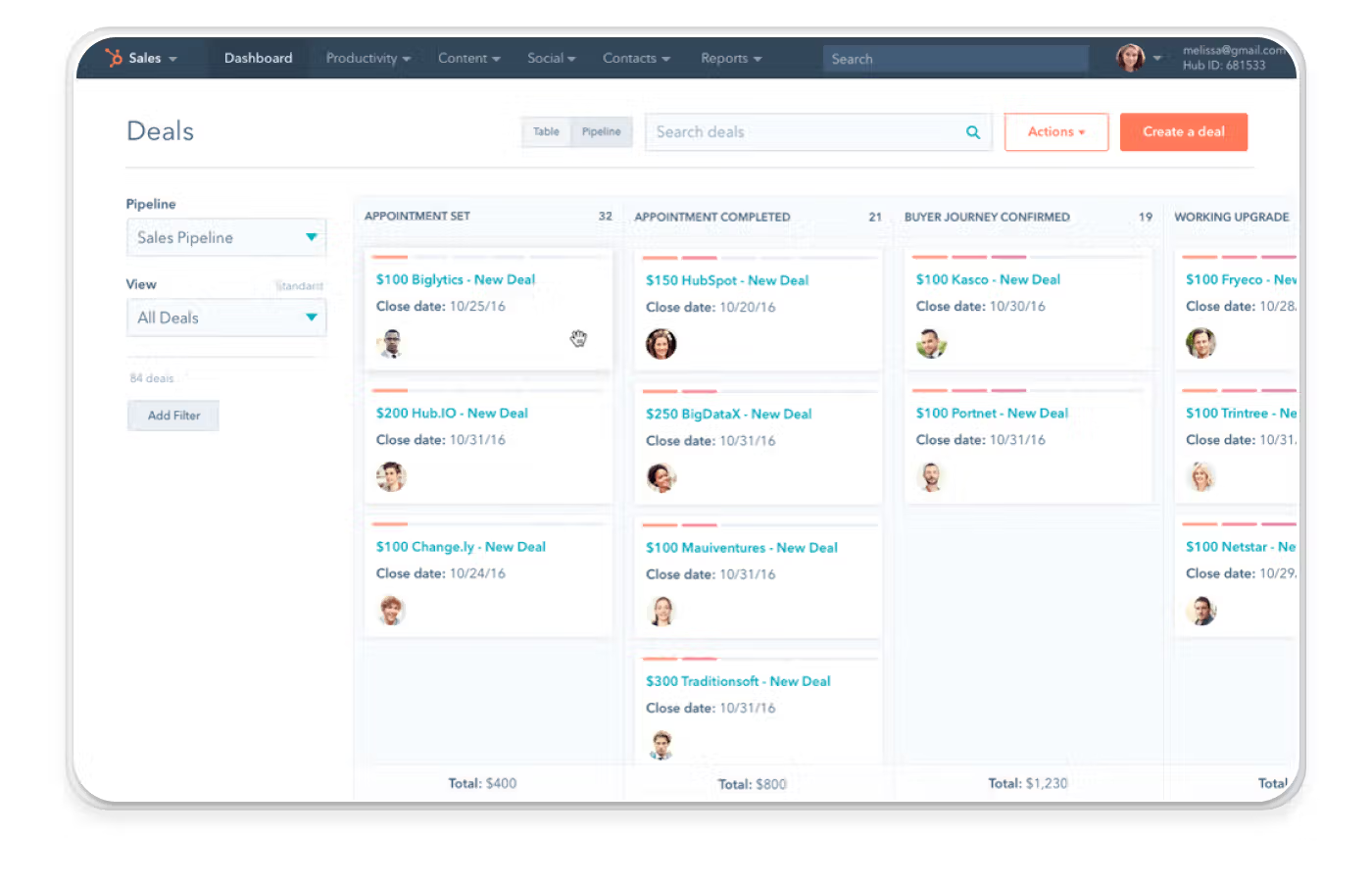
A CRM or Customer Relationship Management tool is central to a sales enablement tech stack helping sales representatives track leads, manage contacts, monitor the sales pipeline, and improve customer engagement.
When it comes to picking a CRM, Hubspot is a popular choice for high-growth / non-enterprise companies, given its speed of implementation and solid integration range. Hubspot is integral to our operations at Qwilr.
We love the intuitive and user-friendly interface, making it easy for our sales team to adapt quickly and get the most out of the system. The platform also allows sales reps to have up-to-date information about prospects and tailor their approach accordingly. The software offers features like automated reminders and notifications as well as robust sales pipeline management, helping reps track the progress of leads, identify potential bottlenecks, and prioritize tasks effectively.
Top features
- Automated data capture: HubSpot CRM automatically logs calls made and emails sent from the system and posts them in a timeline-like view on the contact's record page.
- Email tracking and notifications: offers real-time notifications when prospects open emails, click on links or download attachments.
- Task and activity management features: enable you to create and manage tasks, set reminders, and log activities directly within the CRM.
- Sales pipeline management features: provide visual overviews of your entire pipeline with an intuitive dashboard.
- Integrations: HubSpot CRM integrates seamlessly with other HubSpot tools, such as marketing and customer service platforms, providing a holistic view of the customer journey
Pricing
HubSpot allows companies to access the CRM software for free for up to 1,000,000 contacts with no time limit, expiration date, or cap on the team size. A
Advanced CRM capabilities can be accessed through HubSpot premium Sales Hub products:
- Sales Hub Starter: $15 USD per seat/month
- Sales Hub Professional: $90 USD per seat/month
- Sales Hub Enterprise: $150 USD per seat/month
3. Salesforce: CRM
G2 Rating: 4.4 / 5
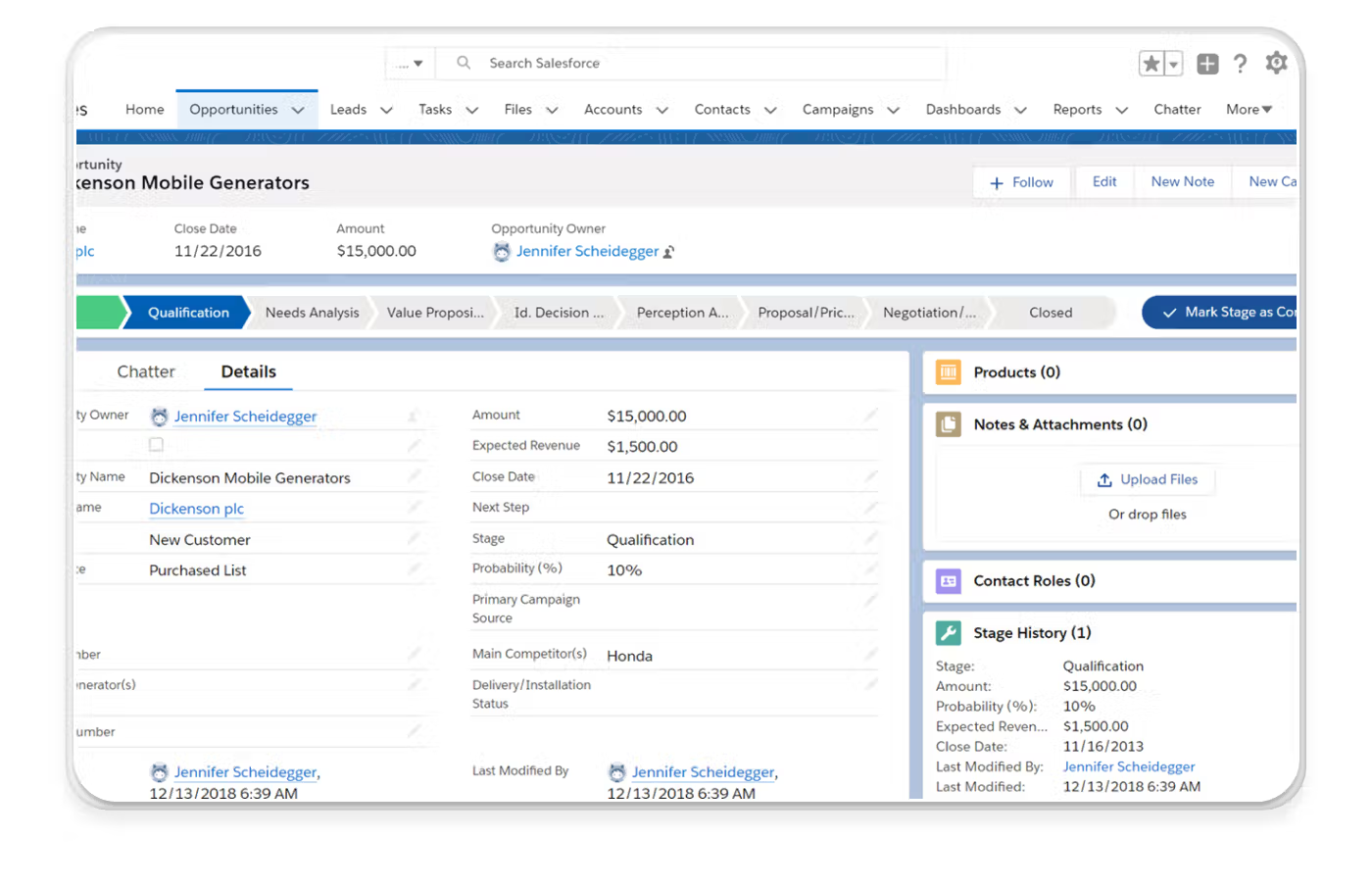
A more suitable CRM option for enterprise-level organizations is Salesforce, given its powerful customization and feature set that revolutionizes how businesses handle customer interactions.
Packed with an array of powerful features, it empowers sales teams to reach new heights of productivity and success.
With Salesforce CRM, companies can centralize their customer data and keep track of every touchpoint in one place, ensuring a personalized and seamless experience for clients.
The platform's robust automation tools streamline routine tasks, freeing up valuable time for sales reps to focus on building relationships and closing deals. Additionally, Salesforce's intuitive reporting and analytics provide valuable insights into sales performance, enabling data-driven decision-making.Its scalability and versatility make it suitable for businesses of all sizes, making Salesforce CRM a game-changing solution for optimizing sales processes and cultivating lasting customer connections.
Top features
- Real-time sales insights: around lead scoring, pipeline inspection, conversation insights, and more.
- Automation features: to automate routine tasks such as data entry, follow-ups, and lead assignments.
- Custom dashboards and reports: to track key sales metrics, performance, and trends, providing insights for data-driven decision-making.
- AppExchange integration: you can access a vast marketplace of third-party apps and tools that integrate seamlessly with Salesforce, extending its functionality for sales enablement.
Pricing
SMB pricing plans:
- Starter Suite: $25 USD per user/month
- Pro Suite: $100 USD per user/month
Enterprise pricing plans:
- Enterprise: $165 USD per user/month
- Unlimited: $330 USD per user/month
- Einstein 1 Sales: $500 USD per user/month
4. Seismic Learning (formerly Lessonly): LMS / learning reinforcement
G2 Rating: 4.7 / 5
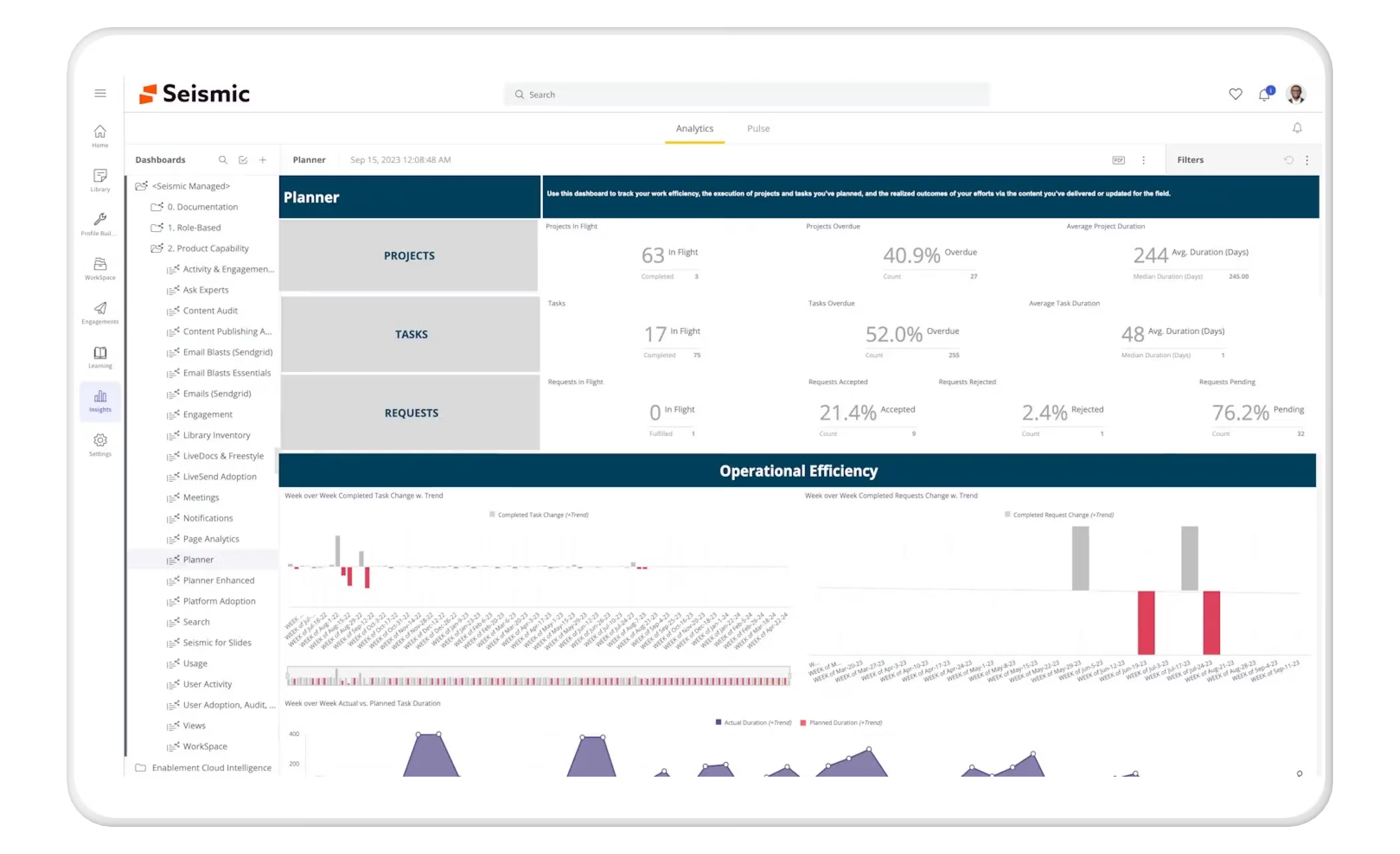
According to Seismic 74% of organizations have sales assets in multiple locations, and 80% of sellers can’t find the needed materials. Now that’s a real bottleneck when it comes to closing deals, isn’t it?
That’s where a Learning Management System (LMS) can be a beneficial addition to your sales enablement tech stack. For sales teams, an LMS can be a game-changer, as it lets your sales reps stay updated on the latest product information, sales techniques, industry trends, and more—all in one place.
Through interactive courses, quizzes, and videos, sales reps can enhance their skills, boost product knowledge, and improve their overall performance. The flexibility of an LMS allows team members to access training materials at their own pace, ensuring that each salesperson receives tailored learning experiences, ultimately leading to more confident and effective sales pitches.
Seismic Learning is a Learning Management System that offers a user-friendly interface, making it easy for sales teams to dive right into their learning journey. With this tool, creating engaging and interactive training content is a breeze, whether it's product tutorials, sales playbooks, or customer service techniques. Its robust analytics tools provide valuable insights into individual and team progress, helping managers identify areas for improvement and measure the impact of training on sales performance.
Top features
- Mobile accessibility: enables salespeople to learn on the go, making it convenient and efficient for busy professionals.
- Sales training modules: create and deliver interactive, engaging training modules that help sales reps learn new skills and product knowledge quickly and effectively.
- Practice scenarios: for reps to practice sales pitches, objection handling, and product demos in a simulated environment, receiving feedback to improve performance.
- Performance tracking: monitor progress and performance of individual reps and teams, identifying areas for improvement and tailoring coaching efforts accordingly.
Pricing
Contact sales team for pricing plans
5. Gong: Sales coaching
G2 Rating: 4.7 / 5
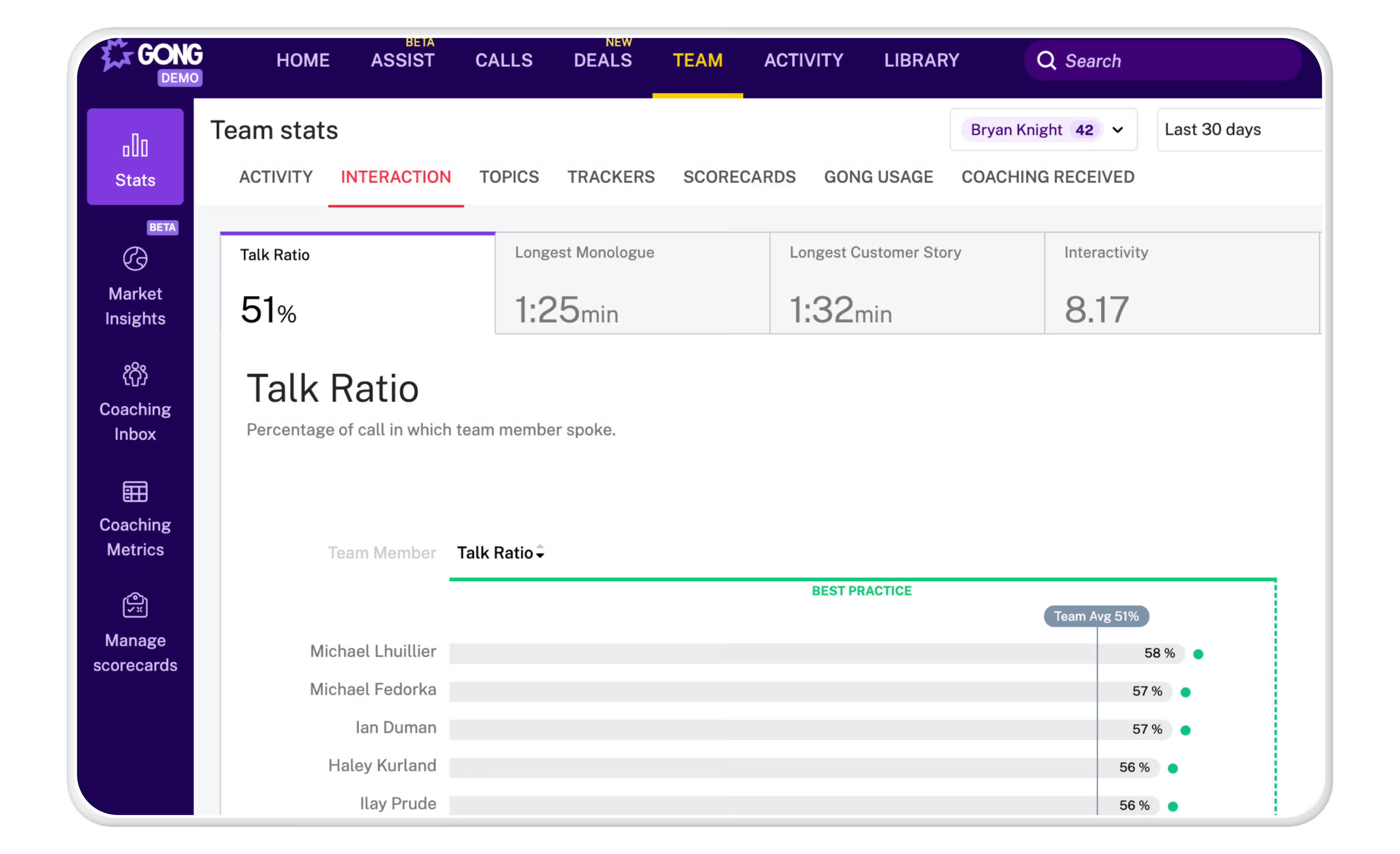
Research indicates that implementing real-time, deal-specific coaching results in an 8% increase in annual revenue, as highlighted by CSO Insights. This underscores the importance of sales coaching tools like Gong in driving sales performance.
Gong is a leading sales coaching tool, and we’re huge proponents of this software at Qwilr as it’s been key in helping us to deeply understand our ICP. Gong uses artificial intelligence to record and transcribe sales calls and meetings automatically. This allows our sales reps and managers to review and analyze conversations, uncovering valuable insights and trends.
With Gong, sales teams can refine their strategies, replicate successful approaches, and continuously elevate their performance, leading to increased sales success and improved customer relationships
Another key aspect of Gong is its coaching and collaboration tools. Managers can provide specific feedback and coaching directly within the platform, making guiding individual sales reps' growth easier. The platform also facilitates knowledge-sharing and collaboration among team members, fostering a culture of learning and camaraderie.
Top features
- Call analytics and conversation intelligence capabilities: provide detailed feedback on crucial elements like talk-to-listen ratio, objections handling, and customer sentiment, helping sales teams pinpoint areas of improvement.
- Comprehensive analytics dashboard: helps sales managers gain a holistic view of team performance, track progress toward goals, and identify best practices.
- Pipeline analysis: gives visibility into your entire sales pipeline, with AI-driven insights that help forecast more accurately and identify at-risk deals.
- Coaching and feedback tools: give sales reps data-backed coaching and recommendations based on their actual call performance.
Pricing
All licenses offered by Gong are priced per recorded user. There is also a platform fee based on the number of users supported—you’ll need to contact their sales team for more details.
6. Outreach: Sales productivity & engagement
G2 Rating: 4.3 / 5
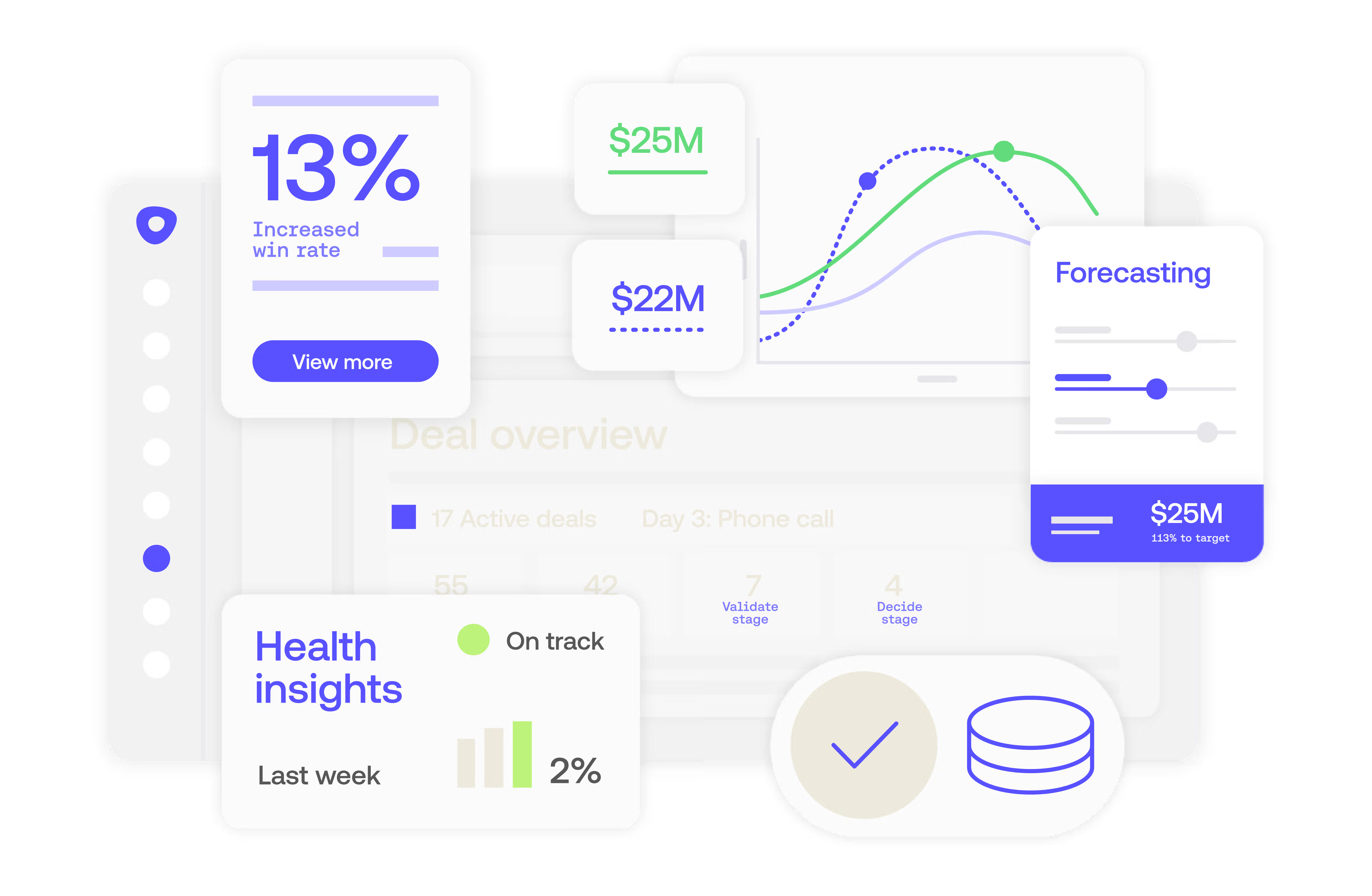
Getting the right message in front of the right people at the right time is the biggest challenge for sales reps across the board. However, with the right sales productivity and engagement, sales reps can streamline their outreach efforts and enhance communication. These tools serve as a centralized platform for managing and automating sales tasks, including email campaigns, follow-ups, and scheduling.
If you’ve been looking to add a tool that does all of this and provides valuable analytics and insights, look no further than Outreach.
Outreach offers multi-channel communication through its high-impact sequences, allowing sales reps to reach prospects through various sales channels like email and phone calls, ensuring a more personalized and impactful approach.
The platform's automation capabilities are another highlight, enabling users to schedule and personalize outreach at scale. Sales reps can set up customized sequences and follow-ups, saving time and ensuring consistent communication with prospective customers.
Top features
- Sales engagement automation: provides the opportunity to automate an array of engagement triggers including emails, calls, and social touches. For example, Outreach identifies when prospects are out of the office and automatically pauses sequences until they return.
- Multi-channel communication: allows you to engage prospects across multiple channels—email, phone, and social media—within a single platform
- Robust analytics and reporting: enables you to track the performance of your sales activities, from email open rates to call outcomes
- A/B testing for outreach messages: to determine through testing the best messaging and sequences for your audience.
Pricing
While the different package options are available on the site, you need to request pricing for each.
7. Showpad Coach: Sales readiness
G2 Rating: 4.4 / 5
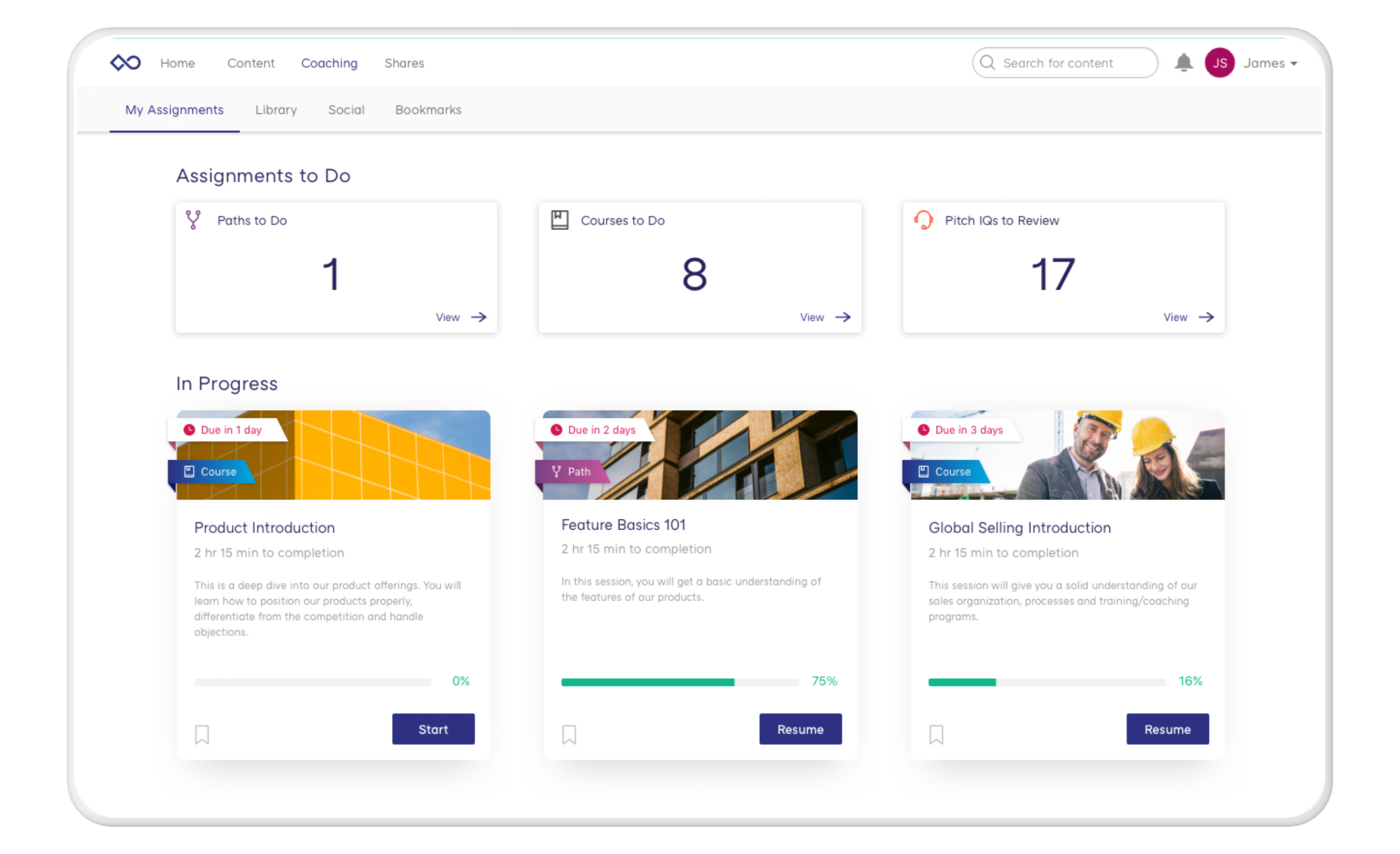
We have spoken about the significance of coaching earlier, and this list will be incomplete without mentioning Showpad Coach.
Showpad Coach’s sales enablement platform empowers sales managers to provide personalized coaching and training to their teams, ensuring that each sales rep receives targeted guidance and development opportunities.
Sales managers can track individual progress and identify areas for improvement, tailoring coaching to suit each team member's specific needs.
Showpad Coach also offers robust analytics and insights, providing valuable data on coaching effectiveness and team performance. With Showpad Coach, sales teams can fine-tune their selling techniques, boost confidence, and drive success in a competitive market.
Top features
- Video coaching features: enables sales reps to record and share practice pitches or presentations, helping them improve consistently.
- Sales training and onboarding: helps sales reps learn and apply skills through structured training and onboarding programs.
- Practice and certification: provides reps with opportunities to practice sales scenarios and earn certifications, ensuring they are fully prepared for real-world interactions.
- Performance analytics features: tracks reps' performance and training progress.
Pricing
You can access different package options online, however you need to request pricing from the sales team.
8. Salesloft (formerly Drift): Conversation cloud
G2 Rating: 4.4 / 5
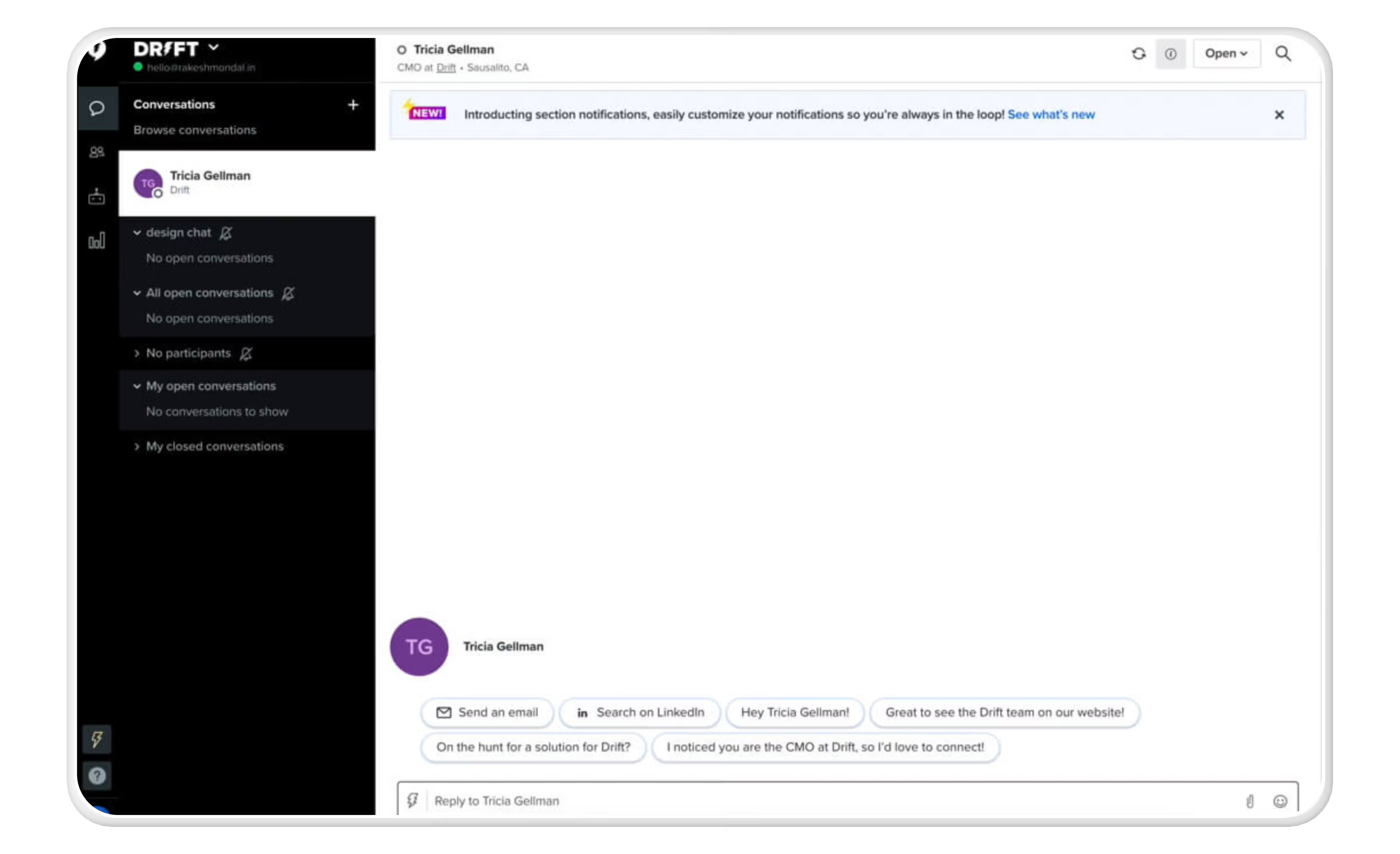
If you’ve been in the SaaS space for a long time, you probably already know Drift's Conversational Cloud—a single platform for personalizing conversations at every stage of the buyer’s journey. Now acquired by and merged with Salesloft, but still the same tool you know and love. So why should you consider this software as a part of your sales tech stack? Quite simply because it offers a range of features to benefit sales teams for driving sales success.
Salesloft’s live chat functionality allows sales reps to engage with website visitors in real time, offering immediate assistance and personalized interactions. This fosters a seamless buying experience and helps convert leads into customers more effectively.
Another notable feature is its integration with customer relationship management (CRM) systems, ensuring that all lead data is seamlessly synced and accessible for sales reps. With Salesloft, sales teams can build stronger relationships with prospects, improve lead conversion rates, and ultimately drive revenue growth.
Top features
- AI-powered chatbots: can handle routine queries, freeing up sales reps' time to focus on more complex tasks. Drift also enables users to book meetings directly from the chat, streamlining the scheduling process and facilitating quicker follow-ups
- Account-based marketing features: enable you to target high-value accounts with targeted messaging and chat experiences.
- Meeting scheduling: allows prospects to book meetings with your sales team through the chat interface
Pricing
Request pricing from the sales team
How to choose the right sales enablement solution
Whether you're a startup new to sales enablement or an established enterprise, remember that sales enablement offerings have drastically advanced in recent years and will continue to do so. Therefore building a world-class sales enablement stack requires careful consideration and a strategic approach.
To create a robust and effective enablement stack, you should take the following key elements into account and ask yourself relevant questions when evaluating different solutions:
Alignment with sales goals and processes
When shortlisting sales enablement technology, it’s vital to ensure that you aren’t adding tools to the mix that don’t align with your sales strategy. It’s good to ensure that the tool aligns with your sales team's specific goals and objectives and integrates with existing sales processes and workflows.
For example, if your sales team heavily relies on a particular CRM platform, ensure that the sales enablement tool seamlessly integrates with it to avoid disruptions and enhance adoption—after all, the purpose is to simplify things rather than complicate them.
Content management and accessibility
A sales enablement tool that offers intuitive search functionality and mobile access can significantly improve content discoverability and make sales reps more productive on the go. If your reps are traveling or spending the majority of their time in the field with customers, it's critical that the tool will work where they need it the most.
To ensure you’re making the right choice, look to see if the platform handles a wide range of content types, including presentations, videos, case studies, and training materials, and offers a user-friendly interface, making it easy for sales reps to access and share relevant content.
Sales training and onboarding support
Regular learning and training are integral to sales enablement, so you'll want to know if the sales enablement software provides training modules and resources to onboard new sales reps quickly and efficiently. Moreover, can the software deliver ongoing training to keep the sales team up-to-date with product updates and sales techniques?
For instance, a sales enablement platform that offers interactive training content and allows tracking progress can help ensure the sales team is continuously improving their skills and knowledge and is a much better fit for your organization than one that does not.
Analytics and insights
As a sales enablement leader, it’s on you to keep the rest of the organization updated about the progress of campaigns, and that’s where sales enablement tools with analytics and reporting capabilities come in extremely handy. It will take less time to set up than manual tracking and can provide you with information on content engagement, identify high-performing assets, and provide insights into sales performance.
For example, advanced analytics tools in the market can measure the impact of content on sales opportunities and can guide sales reps in focusing on the most effective resources. When shortlisting one for your organization, thoroughly evaluate the type of analytics and reporting capabilities your preferred tool offers.
Integration with Existing Technology Stack
Does the sales enablement solution integrate seamlessly with other tools your sales team uses, such as CRM, marketing automation, or communication platforms? How does it enhance data synchronization and avoid duplication of efforts?
A well-integrated sales enablement stack that connects with most cloud-based CRM allows sales reps to view customer interactions, sales conversations, buying history, and other relevant data within a single platform, streamlining their workflow so this is an important consideration when building your tech stack.
Ease of Adoption and Support
Lastly, it’s about the ease of adoption. It’s always good to know how user-friendly the platform is and how much training sales reps need to start using it effectively. Apart from that, don’t miss out on considering the kind of customer support the vendor offers and how responsive they are in addressing issues.
This is important because a well-designed interface and comprehensive support resources can expedite adoption and minimize resistance from the sales team.
By thoroughly evaluating these key elements and asking the right questions, sales leaders can optimize a sales enablement stack that meets their immediate needs and sets the foundation for their sales organization to excel in the long run.
Equip your sales team for success with the right sales enablement software
In today's fast-paced and competitive market, embracing the best sales enablement tools is not just important but crucial for staying ahead and achieving exceptional results.
There are an array of powerful tools that enhance efficiency, productivity, and success—from Customer Relationship Management (CRM) platforms to Learning Management Systems (LMS) to sales coaching software; each tool contributes its unique strengths, collectively creating a cohesive and efficient sales enablement function.
By leveraging these tools effectively, you can streamline processes, deliver personalized experiences to prospects, and make data-driven decisions. So, invest wisely in these tools, equip your sales team for success, and watch as your sales enablement function thrives with heightened efficiency and effectiveness.
About the author

Brendan Connaughton|Head of Growth Marketing
Brendan heads up growth marketing and demand generation at Qwilr, overseeing performance marketing, SEO, and lifecycle initiatives. Brendan has been instrumental in developing go-to-market functions for a number of high-growth startups and challenger brands.

